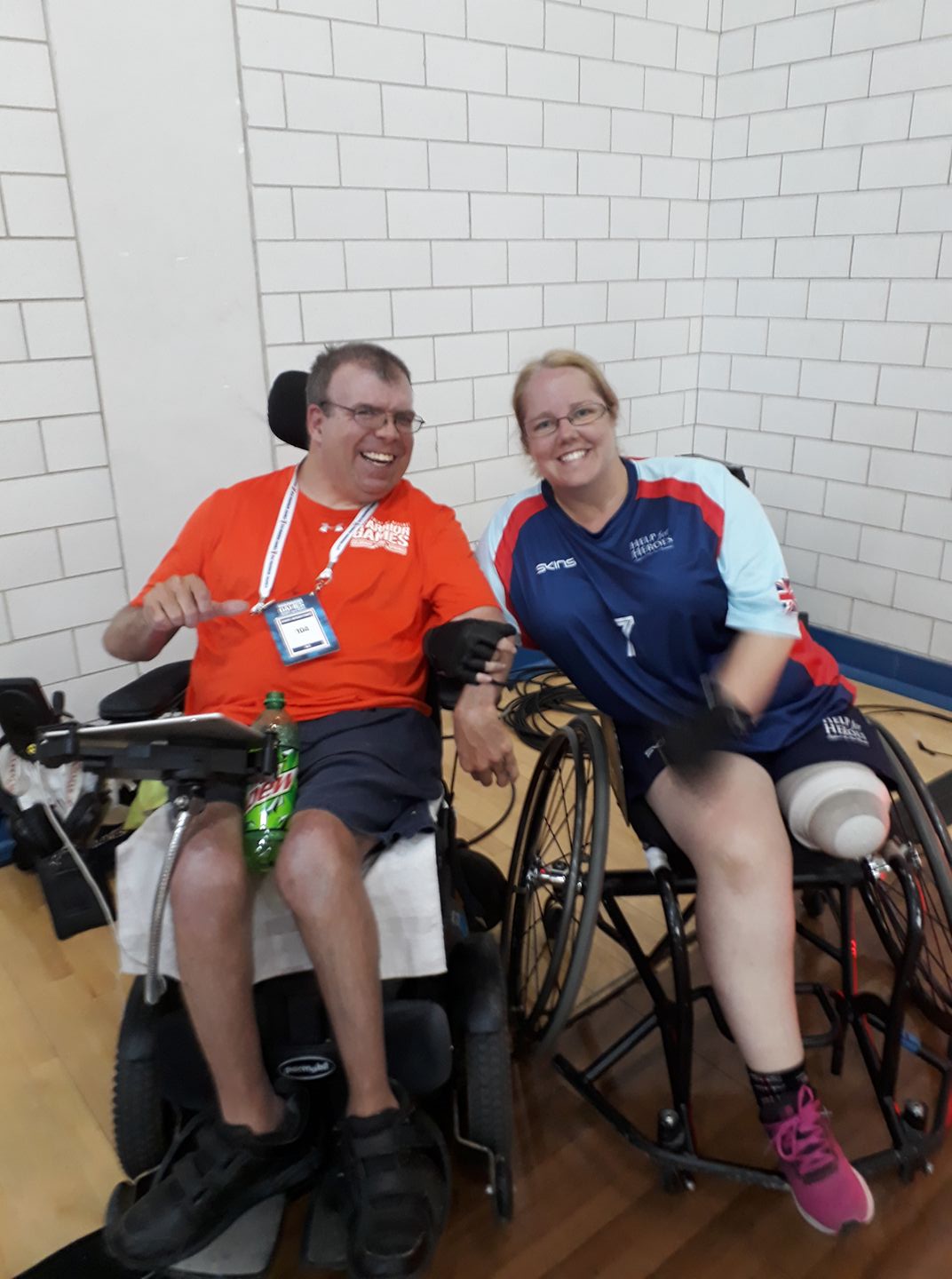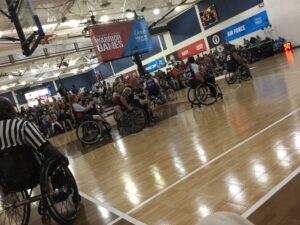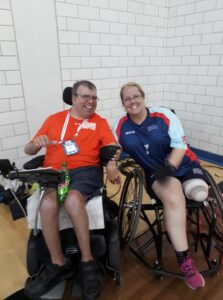
19 Jun Meeting Lisa
Disability is not a brave struggle or ‘courage in the face of adversity.’ Disability is an art. It’s an ingenious way to live.”
– Neil Marcus
I was surprised at how nice it was at the swim meet. It was not too loud or humid in the Air Force Academy’s Natatorium. I parked my chair near the starting blocks to watch some heats. After a while, the cheers got louder and louder as a race was finishing. I looked up at the giant tv screen and saw a participant making his way down the pool on his back. He seemed to be swimming a simple backstroke, something I might swim.
His competitors – who had long completed their race – swam back to cheer him on from the next lane. I leaned forward to see where they were. They were coming into sight but were still a good fifteen meters from me. The cheers got louder and louder as he made his way to the wall and came to a concendo when he finished.
This was the swimming competition of the Warrior Games, a nine day competition of swimming, track and field, basketball, sitting volleyball, among other sports for injured military members. The Warrior Games were established in 2010 as a way to enhance the recovery and rehabilitation of wounded, ill and injured service members and expose them to adaptive sports. The Games encourage them to stay physically active when they return to their local communities, and inspire and promote opportunities for growth and achievement.
My wife and I volunteered for the entire games. Kelly had a list of duties she was responsible for, and I…well…I never did figure out my role. As my friend and another volunteer said, “you’re here to support the athletes.” That made me feel like I belonged. I had my volunteer condendals and could go anywhere I want. I also enjoyed being able to see the behind scenes of Air Force football and hockey,
Back to the games. Throughout the week, I kept hearing comments about how inspiring the athletes were. I totally get it. They are awesome! To be injured in the service of you country and come back to compete in a sport is incredible. People are attracted to inspirational events.
But I soon got tired of hearing about how inspired people were. I don’t deny that is a part of the Warrior Games, but I found myself getting frustrated with the conversation. I finally had to stop and figure out why I couldn’t see the inspiration of these games. Was my heart in the right place? Should I even be volunteering if I couldn’t support these athletes?
Then it hit me. I know exactly what those athletes go through. I am that guy in  the pool! I’d definitely get into that pool and complete my race no matter how long it took! If I used a manual chair, I’d be playing wheelchair basketball. I had a mean spike when I used to play volleyball with my brothers. Track and field…not so much. Shooting? Definitely! (Note to self. Research shooting and see what it’d take to participate in this sport.)
the pool! I’d definitely get into that pool and complete my race no matter how long it took! If I used a manual chair, I’d be playing wheelchair basketball. I had a mean spike when I used to play volleyball with my brothers. Track and field…not so much. Shooting? Definitely! (Note to self. Research shooting and see what it’d take to participate in this sport.)
The difference between these guys at the Warrior Games and me is that I don’t compete in sports. Instead I write. I teach. I worship. How many people come up to me after church and tell me how much they were blessed because of my worship? Someone says something to me every time I belt out a tune.
This is why the inspirational part of the week quickly wore off for me. I was with my peers. I could relate to them. Instead of being inspired because of disability, I just saw people. It doesn’t happen very often when I’m one of many people who have disabilities. In these situations, I’m one in the crowd. I don’t have to explain myself because everybody already knows how to negotiate a disability.
Meeting Lisa
I found a perfect spot to watch wheelchair basketball. I tried to be out of the way, but I got a little too close to the British bench. Pretty soon I was next to a player, a after a timeout another player wheeled to my other side during a timeout. I was officially on the British bench, rooting for Air Force! (I grew up near the Air Force Academy and cheered for its teams since I was a kid and my first jobs were on Air Force bases, so naturally I pull for its teams.)
The player and I started talking. (This, I discovered, was what made the games special. The athletes were approachable and willing to interact with the spectators…even during the game!) Her name was Lisa.
Lisa and I hit it off right away. She told me I had to root for her team. My cheers for Air Force got louder and louder. She got into the game during the second half, and I cheered for her. Air Force was way ahead at this point, and the British needed some love.
After the game we took selfies and friended each other on Facebook. I stuck around for the second game cheering for Lisa this time.
Lisa served in the armed forces for seventeen years in the Royal Army Medical Corps, as a Combat Medical Technician. She was medically discharged in February 2018 when she sustained an injury that eventually led to having an above the knee amputation. Her prosthetic leg is pink, her favorite color. She competed in shot put, wheelchair basketball, and swimming at this year’s games eying at being able to run within the year.
After the basketball competition, Lisa and I kept in touch via Facebook. We  wanted to hang out at the games but kept missing each other. The next time I saw her was at swimming. I missed her events but saw one of her medal ceremonies. She smiled when she saw me and gave me orders to wait for her. When she came back, she had brought me a t-shirt, socks, and a plastic bracelet. We promised to keep in touch when Lisa returned home.
wanted to hang out at the games but kept missing each other. The next time I saw her was at swimming. I missed her events but saw one of her medal ceremonies. She smiled when she saw me and gave me orders to wait for her. When she came back, she had brought me a t-shirt, socks, and a plastic bracelet. We promised to keep in touch when Lisa returned home.
This is another aspect of the games I hadn’t considered. It is always more personal when you know someone’s story. It’s one thing to be inspired by watching someone with a disability from a distance. It’s another thing to know her story. When Lisa told me that she was was medically discharged in February 2018, I was impressed. That was four months before she found herself in the US competing in the Warrior Games. Four months! Wow! And when next year’s games opens in Tampa Bay, Lisa hopes to run in the running events.
When we learn people’s stories, we get to know them personally, and we begin to relate to them. They no longer are people in a bubble or on a pesitel. When it comes to people who have disabilities, their wheelchairs, canes, and prosthetic arms and legs become almost invisible leaving just the person. The disability is always there, yes, but it fades away because personalities shine through. People become who the Lord designed them to be. When this happens, friendships and community truly begins.
Is disability brave or is it an art?
I find this quote by Neil Marcus fascinating. “Disability is not a brave struggle or ‘courage in the face of adversity.’ Disability is an art. It’s an ingenious way to live.”
I wonder how many people attended the Games and thought the athletes were brave. Or how many people see me at the YMCA and admire me for just being there. Do they think I struggle when I lean forward to grab a weight, or do they understand it’s just the way I do things?
For those of us who live with a disability, we learn how to live with what we have. For me, I’ve been disabled all my life. I’ve tested and retested strategies to help me thrive in a world that wasn’t built for me. Do I resent it? To be honest, sometimes. But it is what it is. I must make a choice: I can resent life and complain that it’s not fair, or I can be an artist and thrive. Grow where you’re planted, as some people would say it.
Lisa writes, “Trying new things as an amputee has also opened my eyes. I use to think that I couldn’t do this or couldnt do that. I can. Anyone can. You learn to adapt and do things in a way that works for you. You don’t let the injury (disability define who you are. I learned from It, even embraced it.”
Lisa has learned to see her disability as an art.
As well as the other athletes at the Warrior Games.
And I have, too.
When we begin to see disability as a gift and not a curse and learn how to use our chairs and prosthetic legs like a writer uses words or a painter uses paintbrushes, this is where conversations begin. Does disability suck sometimes? Yes, but the Great Artist is at his easel, and the final picture will be perfect.


No Comments